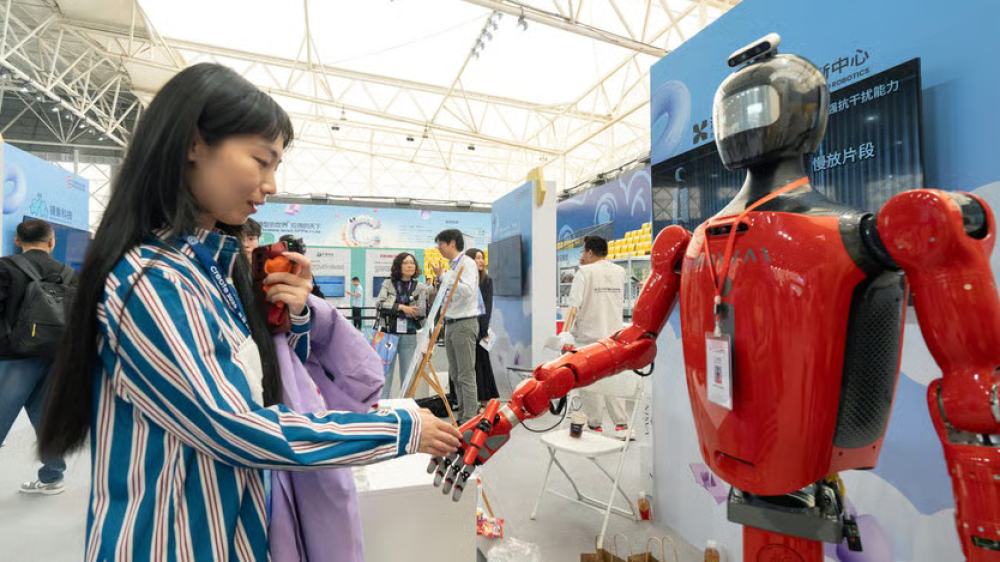C
hina’s internet moguls are nothing if not fiercely competitive. Take, for instance, the jockeying for leadership in the market for cloud services. Baidu, the country’s search giant, surprised industry watchers on May 21st when it revealed that revenue from its cloud-computing business in the first quarter had surged by 42%, year on year, blowing through analysts’ predictions. The same day Tencent, maker of the WeChat super-app, hosted a cloud-computing conference at which it promised a big upgrade to its platform and cut its prices. The next day
Alibaba, China’s biggest e-commerce firm, told an audience at its own cloud-themed conference that it was expanding globally and that its services would soon be available in dozens of countries.
Artificial intelligence (
AI) has set off a new phase of intense rivalry in China’s tech industry. Baidu, Alibaba and Tencent—the country’s original internet giants, known collectively as
BAT—are not the only ones battling for dominance. Bytedance, the company behind TikTok and its local sister app, Douyin, has become a leading force in
Chinese AI.
Huawei, a maker of hardware, is also eyeing the
AI spoils, as are Meituan and
Pinduoduo, two younger tech stars. The upshot is likely to be a period of furious innovation.
The battle over Chinese AI is taking place across three layers: cloud infrastructure, models and applications. Consider each in turn. Cloud-computing sales in China will exceed $50bn this year, and reach nearly $80bn in 2027, according to Morgan Stanley, a bank. Demand for AI will account for much of that growth. For years the market has been led by Alibaba, whose cloud sales in the first quarter grew by 18% year on year. But rivals are gaining ground. Bytedance’s cloud business, Volcano Engine, has expanded rapidly since its launch in 2020. Huawei has carved out a sizeable market share by targeting state-owned enterprises that tend to trust it more than the internet giants.
China’s cloud providers are also developing their own AI models to lure in customers. These efforts have been complicated by DeepSeek, a Chinese startup that has made its cutting-edge models freely available. But some cloud businesses are differentiating themselves with specialised offerings. Baidu, for example, has encouraged robotics companies onto its platform with a “multimodal” AI system that brings together language and vision models.
Then there is the contest to monetise AI through applications. Here the tech giants have very different starting points and strategies. Tencent is perhaps best positioned. WeChat, with 1.4bn active users, is not just a messaging service and a payment system; it also incorporates millions of “mini-apps” that let consumers do everything from shop to order food. Tencent has already begun to embed AI features such as search and image generation, using its own and DeepSeek’s models. It is now developing “agentic” services that can make purchases and perform other semi-autonomous actions on users’ behalf. The company has warned that many such services will end up looking the same; its bet is that the many users and companies already plugged into WeChat will give it an edge.
Alibaba has strengths, too. Hosting one of the world’s largest e-commerce marketplaces provides it with masses of consumer data that can be fed into AI models to fine-tune product recommendations and make advertising on the platform more attractive.
Baidu is less promisingly placed. It lacks the captive user base of its rivals, and its chatbot, Ernie, which is free to use, is cannibalising its search business. Whereas Tencent’s ad revenue grew by 20% year on year in the first quarter, Baidu’s fell by 6%. A third of its search results in April came via generative AI, up from around 20% at the start of the year. Still, Baidu is making strides in other applications. It runs one of the world’s largest fleets of driverless taxis, for which it is using the technology.
In time, AI could further erode the dominance of BAT over China’s internet. Pinduoduo, which has been nipping at Alibaba’s heels in e-commerce for years, is developing its own AI models, as is Meituan, which has evolved from a food-delivery service into another super-app. Huawei has amassed hundreds of millions of users for its smartphones and other consumer devices, whom it could target with AI services of its own.
The biggest threat, though, may come from Bytedance. It holds reams of data on its users’ viewing habits and, thanks to its rapidly expanding e-commerce operation, their shopping patterns, too. Unlike most other Chinese tech firms, it also has a large presence abroad, which gives it more exposure to AI developments elsewhere, as well as better access to talent and semiconductors. The battle over Chinese AI is just beginning. ■




